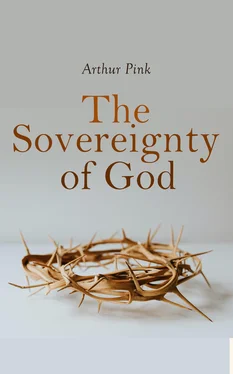Arthur Pink - The Sovereignty of God
Здесь есть возможность читать онлайн «Arthur Pink - The Sovereignty of God» — ознакомительный отрывок электронной книги совершенно бесплатно, а после прочтения отрывка купить полную версию. В некоторых случаях можно слушать аудио, скачать через торрент в формате fb2 и присутствует краткое содержание. Жанр: unrecognised, на английском языке. Описание произведения, (предисловие) а так же отзывы посетителей доступны на портале библиотеки ЛибКат.
- Название:The Sovereignty of God
- Автор:
- Жанр:
- Год:неизвестен
- ISBN:нет данных
- Рейтинг книги:5 / 5. Голосов: 1
-
Избранное:Добавить в избранное
- Отзывы:
-
Ваша оценка:
- 100
- 1
- 2
- 3
- 4
- 5
The Sovereignty of God: краткое содержание, описание и аннотация
Предлагаем к чтению аннотацию, описание, краткое содержание или предисловие (зависит от того, что написал сам автор книги «The Sovereignty of God»). Если вы не нашли необходимую информацию о книге — напишите в комментариях, мы постараемся отыскать её.
The Sovereignty of God — читать онлайн ознакомительный отрывок
Ниже представлен текст книги, разбитый по страницам. Система сохранения места последней прочитанной страницы, позволяет с удобством читать онлайн бесплатно книгу «The Sovereignty of God», без необходимости каждый раз заново искать на чём Вы остановились. Поставьте закладку, и сможете в любой момент перейти на страницу, на которой закончили чтение.
Интервал:
Закладка:
Consider the angelic hosts. Surely we shall find uniformity here. But no; there, as elsewhere, the same Sovereign pleasure of the Creator is displayed. Some are higher in rank than others; some are more powerful than others; some are nearer to God than others. Scripture reveals a definite and well-defined gradation in the angelic orders. From arch-angel, past seraphim and cherubim, we come to "principalities and powers" (Eph. 3:10), and from principalities and powers to "rulers" (Eph. 6:12), and then to the angels themselves, and even among them we read of "the elect angels" (1 Tim. 5:21). Again we ask, Why this inequality, this difference in rank and order? And all we can say is "Our God is in the heavens, He hath done whatsoever He hath pleased" (Psa. 115:3).
If then we see the Sovereignty of God displayed throughout all creation, why should it be thought a strange thing if we behold it operating in the midst of the human family? Why should it be thought strange if to one God is pleased to give five talents and to another only one? Why should it be thought strange if one is born with a robust constitution and another of the same parents is frail and sickly? Why should it be thought strange if Abel is cut off in his prime, while Cain is suffered to live on for many years? Why should it be thought strange that some should be born black and others white; some be born idiots and others with high intellectual endowments; some be born constitutionally lethargic and others full of energy; some be born with a temperament that is selfish, fiery, egotistical, others who are naturally self-sacrificing, submissive and meek? Why should it be thought strange if some are qualified by nature to lead and rule, while others are only fitted to follow and serve? Heredity and environment cannot account for all these variations and inequalities. No; it is God who maketh one to differ from another. Why should He? "Even so, Father, for so it seemed good in Thy sight" must be our reply.
Learn then this basic truth, that the Creator is absolute Sovereign, executing His own will, performing His own pleasure, and considering nought but His own glory. "The LORD hath made all things FOR HIMSELF" (Prov. 16:4). And had He not a perfect right to? Since God is God, who dare challenge His prerogative? To murmur against Him is rank rebellion. To question His ways is to impugn His wisdom. To criticize Him is sin of the deepest dye. Have we forgotten who He is? Behold, "All nations before Him as are nothing; and they are counted to Him less than nothing, and vanity. To whom then will ye liken God?" (Isa. 40:17, 18).
CHAPTER THREE
SOVEREIGNTY OF GOD IN ADMINISTRATION
Table of Contents
"The LORD hath prepared His Throne In the heavens; and His Kingdom ruleth over all" (Psa. 103:19).
First, a word concerning the need for God to govern the material world. Suppose the opposite for a moment. For the sake of argument, let us say that God created the world, designed and fixed certain laws (which men term "the laws of Nature"), and that He then withdrew, leaving the world to its fortune and the out-working of these laws. In such a case, we should have a world over which there was no intelligent, presiding Governor, a world controlled by nothing more than impersonal laws-a concept worthy of gross Materialism and blank Atheism. But, I say, suppose it for a moment; and in the light of such a supposition weigh well the following question: What guaranty have we that some day ere long the world will not be destroyed? A very superficial observation of 'the laws of Nature' reveals the fact that they are not uniform in their working. The proof of this is seen in the fact that no two seasons are alike. If then Nature's laws are irregular in their operations, what guaranty have we against some dreadful catastrophe striking our earth? "The wind bloweth where it listeth" (pleaseth), which means that man can neither harness nor hinder it. Sometimes the wind blows with great fury, and it might be that it should suddenly gather in volume and velocity until it became a hurricane earth-wide in its range. If there is nothing more than the laws of Nature regulating the wind, then, perhaps tomorrow, there may come a terrific tornado and sweep everything from the surface of the earth! What assurance have we against such a calamity? Again; of late years we have heard and read much about clouds bursting and flooding whole districts, working fearful havoc in the destruction of both property and life. Man is helpless before them, for science can devise no means to prevent clouds bursting. Then how do we know that these bursting clouds will not be multiplied indefinitely and the whole earth be deluged by their downpour? This would be nothing new: why should not the Flood of Noah's day be repeated? And what of earthquakes? Every few years some island or some great city is swept out of existence by one of them-and what can man do? Where is the guaranty that ere long a mammoth earthquake will not destroy the whole world. Science tells us of great subterranean fires burning beneath the comparatively thin crust of our earth. How do we know but what these fires will not suddenly burst forth and consume our entire globe? Surely every reader now sees the point we are seeking to make: Deny that God is governing matter, deny that He is "upholding all things by the word of His power" (Heb. 1:3), and all sense of security is gone!
Let us pursue a similar course of reasoning in connection with the human race. Is God governing this world of ours? Is He shaping the destinies of nations, controlling the course of empires, determining the limits of dynasties? Has He prescribed the limits of evil-doers, saying, Thus far shalt thou go and no further? Let us suppose the opposite for a moment. Let us assume that God has delivered over the helm into the hand of His creatures and see where such a supposition leads us. For the sake of argument we will say that every man enters this world endowed with a will that is absolutely free, and that it is impossible to compel or even coerce him without destroying his freedom. Let us say that every man possesses a knowledge of right and wrong, that he has the power to choose between them, and that he is left entirely free to make his own choice and go his own way. Then what? Then it follows that man is Sovereign, for he does as he pleases and is the architect of his own fortune. But in such a case we can have no assurance that ere long every man will reject the good and choose the evil. In such a case we have no guaranty against the entire human race committing moral suicide. Let all Divine restraints be removed and man be left absolutely free, and all ethical distinctions would immediately disappear, the spirit of barbarism would prevail universally, and pandemonium would reign supreme. Why not? If one nation deposes its rulers and repudiates its constitution, what is there to prevent all nations from doing the same?
If little more than a century ago the streets of Paris ran with the blood of rioters, what assurance have we that before the present century closes every city throughout the world will not witness a similar sight? What is there to hinder earth-wide lawlessness and universal anarchy? Thus we have sought to show the need, the imperative need, for God to occupy the Throne, take the government upon His shoulder, and control the activities and destinies of His creatures.
But has the man of faith any difficulty in perceiving the government of God over this world? Does not the anointed eye discern, even amid much seeming confusion and chaos, the hand of the Most High controlling and shaping the affairs of men, even in the common concerns of every day life? Take for example farmers and their crops. Suppose God left them to themselves: what would prevent them, one and all, from grassing their arable lands and devoting themselves exclusively to rearing of cattle and dairying? In such a case there would be a world-famine of wheat and corn! Take the work of the post office. Suppose that everybody decided to write letters on Mondays only, could the authorities cope with the mail on Tuesdays? and how would they occupy their time the balance of the week? So again with storekeepers. What would happen if every housewife did her shopping on Wednesday, and stayed at home the rest of the week? But instead of such things happening, farmers in different countries both raise sufficient cattle and grow enough grain of various kinds to supply the almost incalculable needs of the human race; the mails are almost evenly distributed over the six days of the week; and some women shop on Monday, some on Tuesday, and so on. Do not these things clearly evidence the overruling and controlling hand of God!
Читать дальшеИнтервал:
Закладка:
Похожие книги на «The Sovereignty of God»
Представляем Вашему вниманию похожие книги на «The Sovereignty of God» списком для выбора. Мы отобрали схожую по названию и смыслу литературу в надежде предоставить читателям больше вариантов отыскать новые, интересные, ещё непрочитанные произведения.
Обсуждение, отзывы о книге «The Sovereignty of God» и просто собственные мнения читателей. Оставьте ваши комментарии, напишите, что Вы думаете о произведении, его смысле или главных героях. Укажите что конкретно понравилось, а что нет, и почему Вы так считаете.












